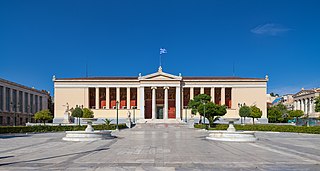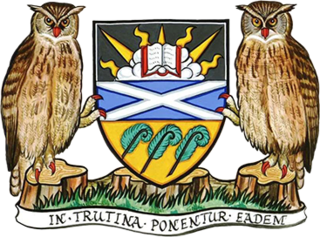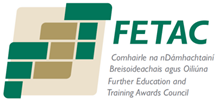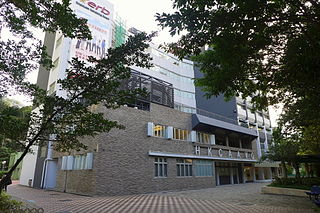National Vocational Qualifications (NVQs) are practical work-based awards in England, Wales, and Northern Ireland that are achieved through assessment and training. The regulatory framework supporting NVQs was withdrawn in 2015 and replaced by the Regulated Qualifications Framework (RQF), although the term "NVQ" may be used in RQF qualifications if they "are based on recognised occupational standards, work-based and/or simulated work-based assessment, and where they confer occupational competence".
Further education in the United Kingdom and Ireland is additional education to that received at secondary school that is distinct from the higher education (HE) offered in universities and other academic institutions. It may be at any level in compulsory secondary education, from entry to higher level qualifications such as awards, certificates, diplomas and other vocational, competency-based qualifications through awarding organisations including City and Guilds, Edexcel (BTEC) and OCR. FE colleges may also offer HE qualifications such as HNC, HND, foundation degree or PGCE. The colleges are also a large service provider for apprenticeships where most of the training takes place at the apprentices' workplace, supplemented with day release into college.

The Qualifications and Curriculum Development Agency (QCDA) was a charity, and an executive non-departmental public body (NDPB) of the Department for Education. In England and Northern Ireland, the QCDA maintained and developed the National Curriculum and associated assessments, tests and examinations, advising the minister formerly known as the Secretary of State for Education on these matters.

Education in England is overseen by the Department for Education. Local government authorities are responsible for implementing policy for public education and state-funded schools at a local level. State-funded schools may be selective grammar schools or non-selective comprehensive schools. All state schools are subject to assessment and inspection by the government department Ofsted. England also has private schools and home education; legally, parents may choose to educate their children by any suitable means.
Education in Scotland is provided in state schools, private schools and by individuals through homeschooling. Mandatory education in Scotland begins for children in Primary 1 (P1) at primary school and ends in Fourth Year (S4) at secondary school. Overall accountability and control of state–education in Scotland rests with the Scottish Government, and is overseen by its executive agency, Education Scotland, with additional responsibility for nursery schools being the joint responsibility of both Education Scotland and the Care Inspectorate. Scotland's private schools are overseen by the Scottish Council of Independent Schools. Children in Scotland sit mandatory National Standardised Assessments in Primary 1 (P1), Primary 4 (P4), Primary 7 (P7) at the end of primary school, and Third Year (S3) in secondary school, which assist in monitoring children's progress and providing diagnostic data information to support teachers' professional judgement.

Education in Greece is centralized and governed by the Ministry of Education, Religious Affairs, and Sports at all grade levels in elementary, middle school, and high school. The Ministry exercises control over public schools, formulates and implements legislation, administers the budget, coordinates national level university entrance examinations, sets up the national curriculum, appoints public school teaching staff, and coordinates other services.

The Scottish Qualifications Authority is the executive non-departmental public body of the Scottish Government responsible for accrediting educational awards. It is partly funded by the Education, Communities and Justice Directorates of the Scottish Government, and employs approximately 750 staff based in Glasgow and Dalkeith.

The Scottish Examination Board (SEB), formerly known as the Scottish Certificate of Education Examination Board (SCEEB), was the academic examination board for Scottish schools from 1965 to 1997.

The Further Education and Training Awards Council or FETAC was a statutory qualification-awarding body for further education in Ireland. It was established on 11 June 2001 under the Qualifications Act 1999. FETAC was dissolved and its functions were passed to Quality and Qualifications Ireland (QQI) on 6 November 2012.
A Scottish Vocational Qualification, or SVQ, is a certificate of vocational education in Scotland. SVQs are available to people of all ages. SVQs are developed by Sector Skills Councils, in partnership with industry and awarding bodies. After the SSC has developed the SVQ structure, awarding bodies can develop the full SVQ and then seek to have the SVQ accredited by the Accreditation Unit of the Scottish Qualifications Authority (SQA). SVQs can be awarded by an awarding body, once the awarding body has been approved by SQA Accreditation.
The Scottish Qualifications Certificate (SQC) is the successor to the Scottish Certificate of Education and the Record of Education and Training, and is the main educational qualification awarded to students in secondary, further, and vocational education. The SQC is awarded by the Scottish Qualifications Authority. It forms part of the wider array of qualifications available in the Scottish education system, including Scottish Vocational Qualifications, Higher National Certificates and Higher National Diplomas. Each level is fully integrated with the Scottish Credit and Qualifications Framework and the three upper levels are awarded UCAS Tariff Points.
A national qualifications framework (NQF) is a formal system describing qualifications. 47 countries participating in the Bologna Process are committed to producing a national qualifications framework. Other countries not part of this process also have national qualifications frameworks.

The Hong Kong Council for Accreditation of Academic and Vocational Qualifications (HKCAAVQ), (HKCAA) is a statutory body established under the HKCAAVQ Ordinance which came into effect on 1 October 2007.

West Lothian College is a further and higher education institution in Livingston, West Lothian, Scotland. The Principal of the college is Jackie Galbraith, who was previously Vice-Principal at Ayrshire College.

The A-level is a subject-based qualification conferred as part of the General Certificate of Education, as well as a school leaving qualification offered by the educational bodies in the United Kingdom and the educational authorities of British Crown dependencies to students completing secondary or pre-university education. They were introduced in England and Wales in 1951 to replace the Higher School Certificate. The A-level permits students to have potential access to a chosen university they applied to with UCAS points. They could be accepted into it should they meet the requirements of the university.

The Constitution of North Macedonia mandates free and compulsory primary and secondary education in the Republic of North Macedonia, and the Law on Primary Education specifies that all children from 6 to 15 years of age attend school for a compulsory 9 years. The Law on High School Education specifies that all adolescents from the ages of 15–19 must attend high school for 4 years.
In the UK education sector, there are a wide range of qualification types offered by the United Kingdom awarding bodies. Qualifications range in size and type, can be academic, vocational or skills-related, and are grouped together into different levels of difficulty. In England, Wales and Northern Ireland, qualifications are divided into Higher Education qualifications, which are on the Framework for Higher Education Qualifications (FHEQ) and are awarded by bodies with degree awarding powers, and Regulated qualifications, which are on the Regulated Qualifications Framework (RQF) and are accredited by Ofqual in England, the Council for the Curriculum, Examinations and Assessment in Northern Ireland and Qualifications Wales in Wales. In Scotland, qualifications are divided into Higher Education qualifications, Scottish Qualifications Authority qualifications and Scottish Vocational Qualifications/Modern Apprenticeships, which are on the Scottish Credit and Qualifications Framework (SCQF). Scottish Higher Education Qualifications are on both the SCQF and the FHEQ.
Examination boards in the United Kingdom are the examination boards responsible for setting and awarding secondary education level qualifications, such as GCSEs, Standard Grades, A Levels, Highers and vocational qualifications, to students in the United Kingdom.
The Scottish Credit and Qualifications Framework (SCQF) is the national credit transfer system for all levels of qualifications in Scotland. Awards are classified under the framework at levels, and study undertaken at that level is valued in credit points. The Scottish Credit and Qualifications Framework Partnership promotes lifelong learning in the country. Through the SCQF, learners can gain a better understanding of qualifications and plan their future learning.
The national qualification frameworks in the United Kingdom are qualifications frameworks that define and link the levels and credit values of different qualifications.









